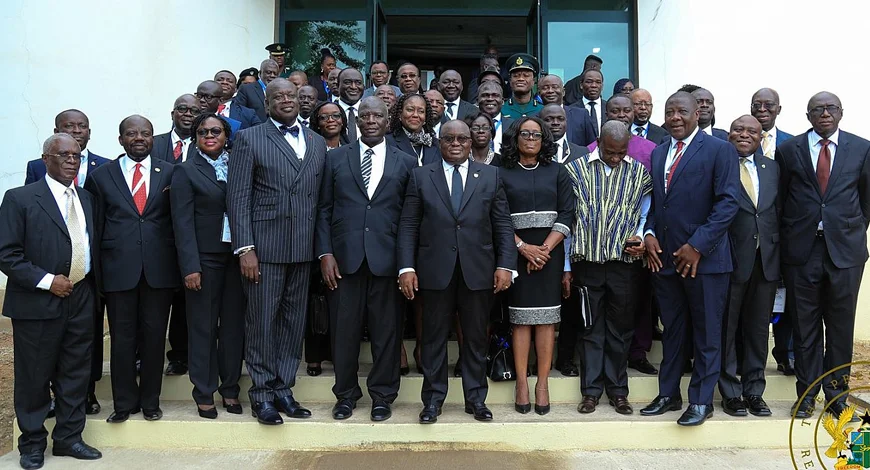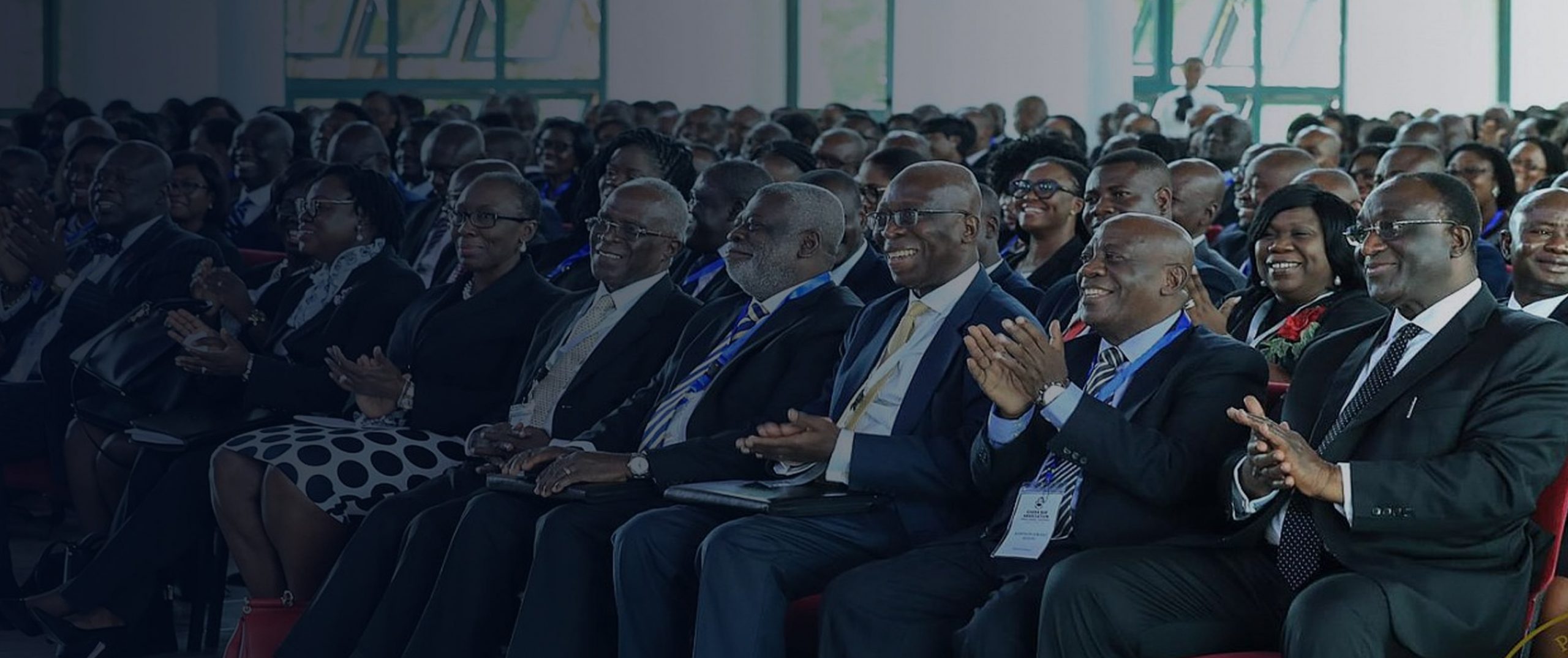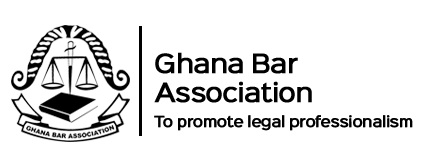About Us
- Ghana Bar Association
- About Us
Brief History of Ghana Bar Association
Our legal system, like so many other institutions in our state, is a direct product of our colonial past. After a few fitful starts, the Supreme Court of Judicature for the Gold Coast Colony was established by ordinance by the Imperial Parliament in Westminster in 1876. It consisted of a Chief Justice and not more than four puisne judges. Provision was further made for a Full Court of Appeal sitting in Accra and Lagos, which was then administered as part of the Gold Coast Colony. The Supreme Court was vested with the same jurisdiction in civil and criminal matters as was exercisable by the Court of Queen’s Bench, the Court of Common Pleas, and the Court of Exchequer. It can be properly said that the establishment of the Supreme Court constituted the commencement of the legal profession in our country. Hence the Bar’s valid claim to be the most senior of the professions in the nation.

The Supreme Court was established to apply the same rules of law and equity as were enforced by the common law courts and the courts of equity in England. Necessarily the existence of a permanent court promoted the emergence of legally trained persons who practised before the Court, and helped the Court to administer justice according to law. Thus it was that ten years after the establishment of the Court in 1876, the first native of the country was called to the Bar by Lincoln’s Inn in 1887 in the person of the famous historic figure of John Mensah Sarbah. Even though 4 or 5 others, Charles Bannerman, James Bannerman, Edmund Bannerman, James Hutton Brew, George Blankson – were on the roll of lawyers before Sarbah, Sarbah was the first barrister to be so enrolled, the others being solicitors.
The English colonial legacy meant that the division of the English profession into barristers and solicitors was initially imported into the colonial Gold Coast. The barrister is the advocate in Court, and the solicitor is the counsellor and the drafter of documents. It was an importation that was to have little impact in that from the very beginning there was no distinction in practice between what a barrister or solicitor could do here. Both were lawyers, and entitled to provide the full range of services of a lawyer – legal advice drafting of deeds, and the conduct of litigation as an advocate in the courts of law. Such has been the development that in 1960 in the Legal Profession Act (Act 32) statutory authority was given to the definition of the lawyers as “the legal practitioner”, which embraces both barristers and solicitors. Strictly speaking, we do not have barristers or solicitors, only legal practitioners.
There have been twenty-one chief justices since the establishment of the Supreme Court in 1876, of which nine have been Ghanaians – the first Sir Arku Korsah appointed in 1956 on the eve of independence, followed by Mr. Justice Julius Sarkodee Addo. Mr. Justice Edward Akufo-Addo, Mr. Justice Lanquaye Bannerman, Mr Justice Azu Crabbe, Mr Justice Fred Apaloo, Mr Justice E.N.P. Sowah, Mr Justice Philip Archer, and the incumbent, Mr. Justice I.K. Abban. The process of “indigenisation” of the Bench reached its conclusion in 1958 when the last non-Ghanaian judge in the person of Mr. Justice Gavin Scott was appointed in 1958. Since then, the entire of the judiciary has been provided by Ghanaians.
From the enrolment of Sarbah in 1887 until the establishment of the Law School in 1958, all lawyers were trained abroad, generally, with few exceptions, in England at the Inns Of Court. _The numbers were thus small, but the establishment of the Law School has led to a dramatic expansion in the membership of the profession. Today it is estimated that there are some 2,500 lawyers in practice. The figure cannot be more accurately stated because not all lawyers take the trouble to register with the Ghana Bar Association and although the records of the Judicial Secretary ought to give an accurate figure those records only indicate the number of persons who have been enrolled since 1876 when the Supreme Court Ordinance was passed, without giving any indication as to how many have died so that one does not have an accurate figure of how many lawyers are actually in practice, but the estimate of 2,500 is thought to be largely correct making provisions for a ten percent margin of error.
The bulk of these practitioners are to be found in the main cities of Accra, Kumasi, Cape Coast, Sekondi-Takoradi, Sunyani, Ho, and Tamale. The establishment of more courts in the regions will inevitably lead to a greater dispersion of practitioners so that one day the entire country will be effectively covered by the profession, thus permitting the ordinary person to have ready access to trained legal services.
Originally, the Ghana Bar Association did not exist as a formal institution in the sense in which we know it today. In those far off days there were, of course, very few lawyers at the Bar and what could be called a bar association was simply an informal meeting of gentlemen at the Bar which was more a social gathering than •anything else. The tradition developed whereby the most senior member of the Bar was designated the leader of the Bar.
The Bar Association in its informal existence had no officers and kept no minutes of its meetings. It is thus difficult for any researcher to find out exactly what the activities of the Bar Association were in those days. It was only relatively recently, in fact within the last quarter of the century, that our Bar Association has kept formal minutes of all its meetings and kept all other records maintained by important professional organisations world-wide. The acquisition of permanent offices and working staff for the Bar Association is also a very recent occurrence and the maintenance of permanent offices by the Bar has been going on now for not any more than some twenty years.
The Bar has had many leaders but apart from a few outstanding ones like Frans Dove there is no proper record of the office holders of the Bar before relatively recently in 1957, only some 39 years ago, from which time the Bar Association has regularly had a president, a secretary and treasurer and other members democratically elected in accordance with the constitution of the Bar. The Bar Association drew up its first formal constitution and code of ethics in 1958 and from then on except for a few occasions when due to political reasons an annual conference has not been possible, the Bar Association has held a conference annually take important decisions and to elect its officers who hold office for only one year but are eligible ror re-election. The Dar Association considers tnat in this scnsc it is one of the most democratic institutions in this country and it is not for nothing that its members, from the first Ghanaian barrister, John Mensah Sarbah, onwards, have fought for the establishment and maintenance of democracy in this country.

The Annual Conference of the Ghana Bar Association is the supreme authority of the Association. All resolutions and important decisions of the Association must be approved by the Annual Conference and so must all constitutional amendments. At the Annual Conference of the Association, learned papers of academic and professional importance are from time to time presented by eminent members of the legal profession both local and foreign.
Apart from matters affecting the legal profession, the Annual Conference of the Bar discusses problems affecting the nation whether in the political, social, education, economic or other fields and also international matters and takes decisions on these matters.
So important has been the voice of the Ghana Bar Association that various governments of various political hues have attempted at one time or the other to control the Association but none has succeeded. All such efforts have failed. The Ghana Bar Association has continued to maintain its independence of all organs of government and has at all times not failed to oppose governmental measures or measures proposed by the judiciary or the legislature that it considers inimical to democracy or to the larger interest of the people of this country.
Sometimes the officers of the Bar Association have fiercely maintained their independence even to the extent of risking their personal liberties. In the case of the late “Doyen of Gold Coast Politics”, Dr J.B. Danquah, he made the supreme sacrifice for his defence of fundamental freedoms and the liberty of the individual.
The Ghana Bar Association has branches in every region of the country with a regional executive from which representatives, at the present moment the regional president and the regional secretary, are sent to the meetings of the General Council of the Bar which is the body that manages the affairs of the Association between one annual conference and the next. On a day-to-day basis the work of the Ghana Bar Association is carried on by a national executive committee which is answerable to the General Council of the Bar and which contains all the national officeholders of the Association.
The Association is proud not only of its history as the defender of the rights and liberties of the people, but also of the quality of the professional services its members have rendered here and abroad. The alacrity with which forcign nations engage the services of Ghanaian jurists is vivid evidence of this quality. Any association worth its salt, however, is ultimately judged by its contribution to social progress and advancement, and here no more eloquent testimony is available than that provided by the incumbent Chief Justice at the time of the celebration of the centenary in 1976 of the establishment of the Supreme Court, Mr. Justice Azu Crabbe when he said:
“If our legal history has been eventful in this past century, we can also say that we have been lucky in the people of our nation who have been alive, in every generation, to match the grandeur of the events of their time. We have, in these years past, never needed a hero in the law to speak up for our people – a Casely Hayford to warn the imperial Power to keep our lands inviolate; a Mensah Sarbah to plead the people’s cause in the highest councils of Empire; a Coussey to guide in the writing of our first constitution towards independence; in our own lifetime, a Danquah to keep us reminded of the need for legal self-discipline in the tumultuous years immediately after independence, and a Korsah to hold, first among our people, the scales ofjustice evenly between the Government, the Legislature and the People. “
